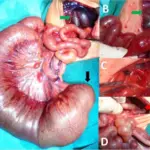Diaphragmatic hernia is a birth defect where there is a hole in the diaphragm. Organs in the abdomen such as intestines, stomach, and liver can move through the hole in the diaphragm and upwards into a baby’s chest.
What is the Pathology of Diaphragmatic Hernia?
The pathology of diaphragmatic hernia is:
-Etiology: The cause of diaphragmatic hernia is may be related to chromosomal or genetic disorders.
-Genes involved: GATA4 and SOX7.
-Pathogenesis: The sequence of events that lead to diaphragmatic hernia is incomplete formation of the posterolateral portion of the diaphragm. The hole in the diaphragm allows the abdominal viscera to invade the thoracic cavity, which blocks normal lung development.
-Histology: The histology associated with diaphragmatic hernia shows changes in alveolarization, and severely hypoplastic lungs.
How does Diaphragmatic Hernia Present?
Patients with diaphragmatic hernia typically in males with gestational age of 24-37 weeks. The symptoms, features, and clinical findings associated with diaphragmatic hernia include difficulty breathing, increaded heart beat, blue skin discoloration, and bowel sounds in the chest area.
How is Diaphragmatic Hernia Diagnosed?
Diaphragmatic hernia is diagnosed by physical exam, ultrasound, and x-ray.
How is Diaphragmatic Hernia Treated?
Diaphragmatic hernia is treated by surgical repair.
What is the Prognosis of Diaphragmatic Hernia?
The prognosis of diaphragmatic hernia is fair.



